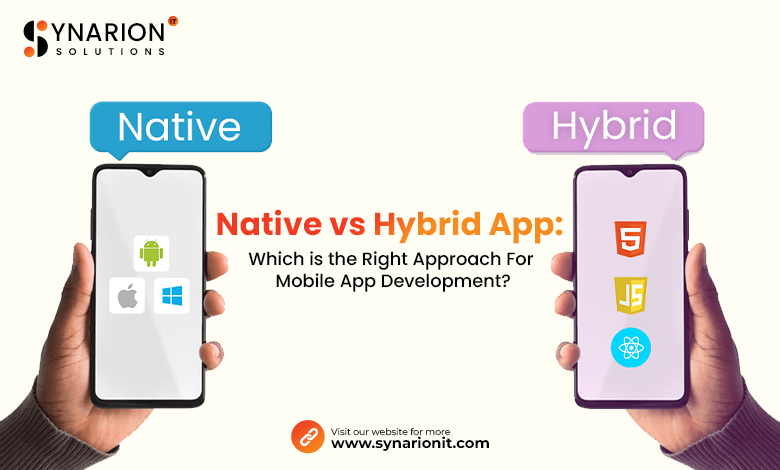
Introduction
In the realm of mobile app development, choosing between hybrid and native app development approaches is a critical decision that can significantly impact the success and performance of your application. Both approaches have their strengths and weaknesses, and understanding the nuances between them is essential for making an informed decision that aligns with your project requirements and business goals.
Understanding Hybrid App Development
Hybrid apps are built using web technologies such as HTML, CSS, and JavaScript, and are then wrapped in a native container that allows them to run on multiple platforms (e.g., iOS and Android). They are essentially web apps packaged within a native app shell, providing a cross-platform solution that leverages web technologies for development.
Advantages of Hybrid App Development
Cross-Platform Compatibility
One of the primary advantages of hybrid apps is their ability to run on multiple platforms with a single codebase. This can significantly reduce development time and cost compared to building separate native apps for each platform.
Faster Development
Since hybrid apps use web technologies familiar to many developers, development cycles can be faster, especially for teams with expertise in web development.
Cost-Effectiveness
Developing a single codebase that runs on multiple platforms can be more cost-effective than maintaining separate native codebases for iOS and Android.
Easier Maintenance
Updates and bug fixes can be applied universally across all platforms, simplifying the maintenance process.
Access to Device Features
Hybrid frameworks like Ionic and React Native provide plugins and APIs that allow access to device features such as camera, GPS, and contacts, bridging the gap between web and native capabilities.
Disadvantages of Hybrid App Development
Performance Limitations
Hybrid apps may not perform as well as native apps, especially for complex and graphics-intensive applications. They rely on a WebView component for rendering content, which can lead to slower performance compared to native apps.
Limited Native Functionality
While hybrid apps can access device features through plugins, they may not offer the same level of performance and seamless integration as native apps.
Dependency on Third-Party Frameworks
Hybrid development often relies on third-party frameworks and plugins, which may introduce compatibility issues or require additional customization.
User Experience
Achieving a native-like user experience can be challenging with hybrid apps, as they may not always replicate the smoothness and responsiveness of native applications.
Understanding Native App Development
Native apps are developed using platform-specific languages and tools provided by the platform vendors (e.g., Swift or Objective-C for iOS, Java or Kotlin for Android). They are designed to leverage the full capabilities and performance of the underlying operating system, providing a seamless and optimized user experience tailored to each platform.
Advantages of Native App Development
Optimal Performance
Native apps are optimized for their respective platforms, leveraging native APIs and hardware acceleration to deliver superior performance and responsiveness.
Superior User Experience
Native apps offer a polished and intuitive user interface that aligns with platform-specific design guidelines, enhancing usability and engagement.
Access to Platform-Specific Features
Developers have full access to platform-specific features and functionalities, enabling deeper integration with device hardware and software capabilities.
Offline Functionality
Native apps can offer robust offline capabilities, allowing users to access content and perform tasks without an internet connection.
Enhanced Security
Native apps benefit from platform-specific security features and guidelines, reducing the risk of vulnerabilities and ensuring data protection.
Disadvantages of Native App Development
Higher Development Costs
Building separate apps for iOS and Android requires more development time, resources, and expertise, which can increase overall project costs.
Longer Development Time
Developing and maintaining separate codebases for each platform can lead to longer development cycles and deployment timelines.
Platform Dependence
Each platform (iOS and Android) requires specialized knowledge and skills, potentially limiting the scalability and flexibility of development teams.
Maintenance Challenges
Updates and bug fixes must be implemented separately for each platform, which can be time-consuming and resource-intensive.
Choosing the Right Approach for Mobile App Development
The decision between hybrid and native app development should be guided by several factors, including project requirements, budget constraints, timeline, and long-term strategic goals. Here are some considerations to help you determine the best approach for your mobile app development project:
Target Audience and Market Reach
If your target audience spans multiple platforms and you need to reach a broad market quickly, a hybrid approach may be more suitable due to its cross-platform compatibility and faster development cycles.
Performance and User Experience
If your app requires high performance, complex animations, or seamless integration with device hardware (such as camera or GPS), native development is typically preferred for its superior performance and native user experience.
Budget and Resources
Consider your budget constraints and available resources. Hybrid development may offer cost savings initially due to its single codebase, whereas native development may require higher upfront investment but can provide better long-term scalability and performance.
Timeline and Speed to Market
If speed to market is crucial and you need to launch your app quickly across multiple platforms, a hybrid approach can help accelerate development and deployment timelines.
Long-Term Maintenance and Flexibility
Assess the long-term maintenance requirements of your app. Native apps may require more effort to maintain and update separately for each platform, whereas hybrid apps can streamline maintenance with universal updates.
Technical Requirements and Complexity
Evaluate the technical requirements and complexity of your app. For simple applications with basic functionality, a hybrid approach may suffice. However, for complex applications requiring advanced features and optimal performance, native development is often recommended.
The Role of a Mobile App Development Company
Partnering with a reputable mobile app development company is essential for navigating the complexities of hybrid and native app development. A skilled development team can assess your project requirements, recommend the most suitable approach, and leverage their expertise to deliver a high-quality, scalable solution tailored to your business needs.
Conclusion
In conclusion, the choice between hybrid and native app development hinges on a thorough evaluation of your project requirements, budget considerations, timeline constraints, and long-term strategic goals. Both approaches offer unique advantages and challenges, and the decision should be guided by factors such as target audience, performance expectations, user experience goals, and technical complexity. Whether you opt for the flexibility of hybrid development or the performance optimization of native development, partnering with a knowledgeable mobile app development company can ensure that your app meets industry standards, engages users effectively, and achieves your business objectives in the competitive mobile app landscape.







